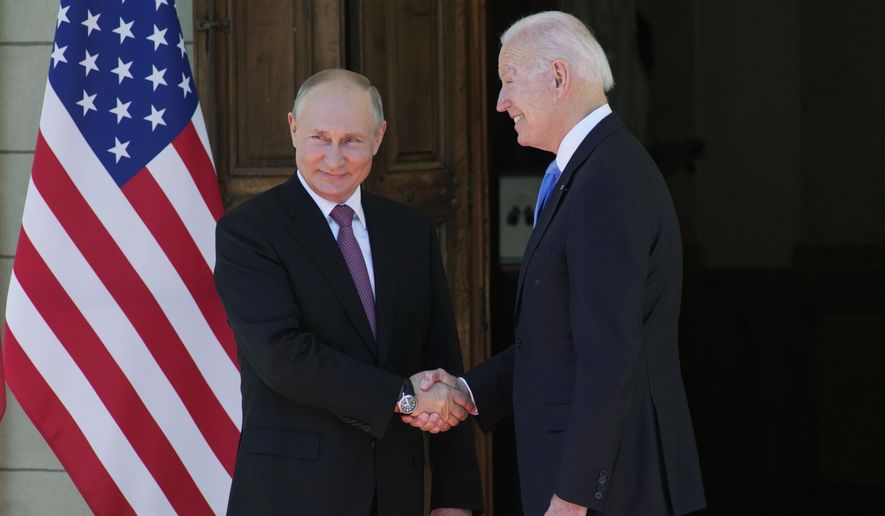OPINION:
Last week President Biden and Russian President Vladimir Putin held a nearly hour-long call, at Mr. Putin’s request. It was the second call in one month, as Mr. Putin looks to take advantage of Mr. Biden’s weak political stature at home and inches closer toward invading Ukraine.
Mr. Biden — like many times before — made concessions to the Russian president by saying the U.S. would not deploy any troops to Ukraine or place any missiles there. Mr. Biden immediately took two military options off the table as Russia looks to expand its footprint in the East.
The call comes before a series of talks between the two countries this month. There’s little doubt, Mr. Putin requested the call to set the tone for those meetings and to gather further intelligence on Mr. Biden’s potential reaction if and when he decides to invade.
Mr. Biden told Mr. Putin he faces two options: one of de-escalation and diplomacy, or one where Russia invades and is met with stringent economic sanctions and increased military aid to Ukraine.
Mr. Putin has played this game before. The last time Mr. Biden, Secretary of State Antony Blinken, National Security Adviser Jake Sullivan and Domestic Policy Council Director Susan Rice were in office, Russia seized nearby Crimea from Ukraine in 2014, giving it critical position on the Black Sea. The Obama-Biden response was pathetic. After warning Mr. Putin there were “consequences,” the former administration slapped Mr. Putin with visa denial and frozen assets for 11 people, seven of them Russian. None of them were on the leaders of the country, any oligarchs or Mr. Putin’s inner circle — no targeting of the energy sector.
Before Mr. Putin’s 2014 invasion, the Obama administration pursued the failed “Russian-reset” and allowed them entrance into the World Trade Organization, thinking international ties would restrain Mr. Putin’s behavior. It only emboldened him. Mr. Putin couldn’t care less about what the international world thinks of him.
Flash-forward eight years and the Biden administration is repeating former President Barack Obama’s mistakes.
Last year, Mr. Biden lifted sanctions on the Russian Nord Stream 2 Pipeline, which has since been completed. The pipeline is a geopolitical gift for Mr. Putin, with one Biden State official recently saying energy is “the cash cow that enables” the Russian dictator.
The decision to lift the sanctions came just two weeks after the Russian criminal group DarkSide disrupted America’s energy supply with a ransomware attack on the Colonial Pipeline. When Mr. Biden met with Mr. Putin last year, after the attack, he weakly gave Mr. Putin a list of 16 sectors that he said should be “off-limits” to Russia.
Mr. Biden’s war on domestic energy is fueling Russia’s oil industry, with Americans paying on average over $3.30 per gallon at the pump while Russian exports of oil to the U.S. hit an all-time high earlier this year.
After Mr. Biden’s Dec. 7 call with Mr. Putin, where the White House would like us to believe he made clear to Mr. Putin he must end his aggression toward the occupation of Ukraine, Mr. Putin added at least 10,000 more troops to Ukraine’s border.
While Mr. Biden claimed he would “command the respect” of Mr. Putin, he is now weakly trying to appease him with “any accommodation” to avoid a full-blown territorial grab.
Mr. Putin has the upper hand and knows it. The only Russia policy the Biden administration has is one of weakness.




Please read our comment policy before commenting.